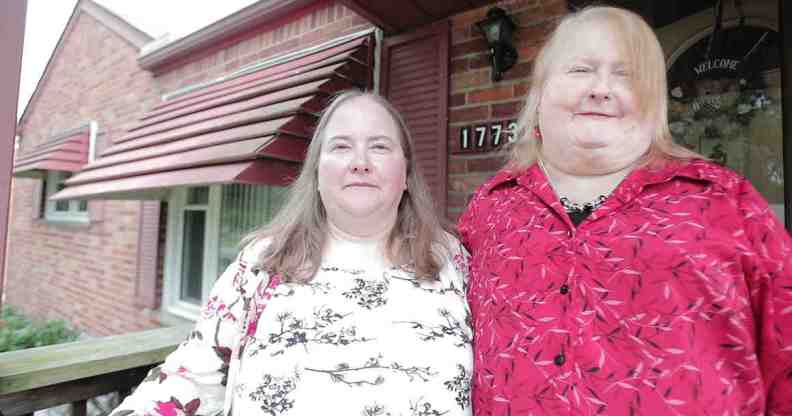This is everything you need to know about Aimee Stephens’ landmark Supreme Court case

Aimee Stephens (right) and her wife, Donna. (ACLU)
The US Supreme Court will today hear its first-ever case about transgender civil rights.
In the case of Aimee Stephens, the Supreme Court will look – for the first time in its history – at whether trans people are protected from employment discrimination.
Stephens’ case is one of a set of cases being heard today, October 8, that could determine whether millions of LGBT+ workers are protected under the US’s most powerful federal workplace anti-discrimination law, or whether it is legal to fire people on the basis of their identity.
The three cases are the first regarding LGBT+ rights to be heard with two new, president Trump-appointed Supreme Court justices, Brett Kavanaugh and Neil Gorsuch.
Although the Supreme Court has expanded LGBT+ rights in recent years, including mandating that same-sex marriage is protected by the constitution, it has not yet applied protections to the workplace.
Only around half of US states have anti-discrimination workplace protections for LGBT+ people – meaning that, in half of the country, LGBT+ workers are without protection and can be fired for their sexuality or gender identity.
The U.S. Supreme Court will consider three cases that could decide whether federal non-discrimination laws apply to LGBTQ people. #RiseUpOct8 #SCOTUS pic.twitter.com/ztTn8A4a3F
— Human Rights Campaign (@HRC) October 4, 2019
Aimee Stephens and Harris Funeral Homes.
Stephens, 58, worked for Harris Funeral Homes in Detroit, Michigan, for six years.
In July 2013, she informed her boss, Harris Funeral Homes owner Thomas Rost, that she was trans and intended to come to work dressed in clothing worn by women in the three funeral homes he owned.
This meant coming to work wearing a skirt suit or dress.
Two weeks later, Rost handed Stephens a letter that said “this is not going to work”, Stephens told the Associated Press.
Stephens complained to the federal Equal Employment Opportunity Commission, which agreed to sue the funeral home. A trial judge ruled against her but then a federal appeals court in Cincinnati sustained her complaint, saying that discrimination on the basis of trans status is sex discrimination.
That appeals court also separately found that she was fired because Rost had sex stereotypes about Stephens’ appearance and dress – in that, she didn’t conform to what he deemed to be female-presenting.
Rost had testified that Stephens coming to work in women’s clothes would be “a distraction that is not appropriate” for grieving families.
Rost appealed, and the Supreme Court agreed to hear the case.
What does ‘sex’ mean?
Federal employment protections come from Title VII of the 1964 Civil Rights Act, which forbids employers from discriminating against their employees on the basis of sex, race, colour, national origin and religion.
The 6th circuit court of appeals already ruled that firing Stephens was discriminatory on the basis of her sex under the Civil Rights Act.
In its judgement, the court said that it was “analytically impossible” to fire an employee for being trans without that “being motivated, at least in part, by the employee’s sex”.
“Discrimination against employees, either because of their failure to conform to sex stereotypes or their transgender and transitioning status, is illegal under Title VII,” the court said.
But Harris Funeral Homes will say that Title VII does not cover sexual orientation or gender identity,
And in a brief filed to the Supreme Court in August 2019, the Trump administration’s justice department said that it is legal to fire someone for being trans.
The justice department argue that “sex”, as defined in the 1964 Civil Rights Act, meant biological sex and does not encompass gender identity.
The ramifications of the Supreme Court’s judgment on this will be widespread. Legally defining sex as including gender identity could give trans and gender non-conforming people better protections in other areas such as housing and healthcare.
LGBT+ people rally behind the case.
LGBT+ people in the US will be heading to the Supreme Court to show their support for Stephens’.
Actress Laverne Cox urged LGBT+ people to go to planned protests in Washington, DC, today, and told BuzzFeed that this case is historic.
“They’re really trying to say that we’re not who we say were are,” Cox said of opponents, “that we were always and only the gender we were assigned at birth and if the Supreme Court decides that, it has ramifications in all kinds of law.”
Stephens is being represented by the ACLU.
Despite worsening health problems – compounded by losing her health insurance when she was fired – she will attend today’s hearing.
The Supreme Court’s decision is expected in spring 2020.

